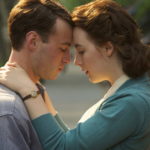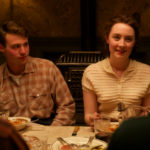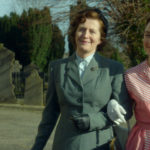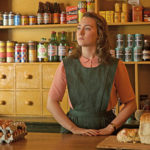Ah Brooklyn. Having stayed in the basement of a brownstone house myself, I have fond memories of the place, even if it was largely a base for the short subway ride over Brooklyn Bridge to the many pleasures of neighbouring Manhattan. From Brooklyn Heights you get an excellent view and there are plenty of cafes from which to enjoy the cosmopolitan atmosphere of the borough of Brooklyn at the southern end of Long Island.
But the culture and population of Brooklyn portrayed in the poignantly romantised Brooklyn in the early 50s is radically different, brownstone houses notwithstanding. It is the era where Irish people left the old country in droves and set up home in the brave new world of America, alongside the Italians – and many more nationalities, not that they are depicted in this film.
Such was the foundation on which the great American dream was built, making it all the more ironic that immigration is now such a divisive subject the world over. A touch of ironic perspective like that might well have enhanced this movie, but more of that later.
Unsurprisingly, this is an adaptation by writer Nick Hornby and director John Crowley of the novel of the same name by Colm Tóibín, though unlike the majority of Hornby’s previous works it features nothing related to Arsenal football club.
Let me be clear from the start: Brooklyn is a film that won critical plaudits; it is well-made with high production values, beautifully performed, immaculately filmed and delivered with no lack of polish (arguably too much hazy-tinted nostalgia for its own good); it charmed the socks off audiences everywhere… but left me cold.
Sentimentality apart, and this is in essence an innocent love-triangle split between the New World and the Old that unashamedly aims to manipulate an audience’s emotions, I felt it lacked grit and true human feeling. By this I mean that while playing straight worked well, the moments requiring emotion did not translate at all convincingly – possibly because the cast did not believe in them either.
That said, you can’t blame a fine cast of actors, led by Saoirse Ronan (an Irish/American actress herself) who play a naturalistic style with some verve. After all, they include the likes of Jim Broadbent and Julie Walters, who have never put in a bad turn in their lives! To be fair, Domnhall Gleeson (whom I recently praised in Ex-Machina) and Emory Cohen also do well with stereotyped roles.
However, the story is predictable and travels similar ground to a number of other films; it’s difficult to make ring true and fresh a narrative jumping through the same hoops, as I recently pointed out about WWII movies though true of many a period tale. People will tell you it’s about breaking away from oppressive culture and measuring opportunity against duty, but they aren’t exactly novel twists either.
The film certainly adds little innovative insight that we did not previously know, not helped by the prevalence of multiple narrative and cinematic cliches – the inevitability of Ronan’s Eilis losing her virginity to her American beau shortly before a secret wedding, for example. She has to make her choice at the end, and nobody will be expecting anything other than the choice she makes.
Question is then why I feel jaded by Brooklyn while others wept and sighed by their thousands. The answer may well be that people know what they like and like what they know, and this particular genre presses all the right buttons for those viewers. No doubt millions read the book, but if I saw it on a secondhand stall I would ignore. Sorry, but not my scene.

















